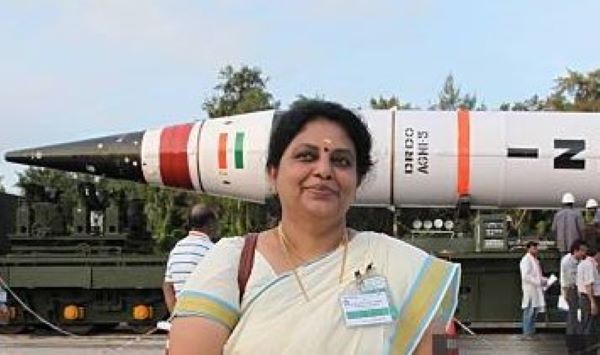
Rocket or aircraft flying seldom steers career of a person. The 61-year-old Kerala-born Defence Research and Development Organisation (DRDO) scientist, Tessy Thomas stands exception.
The native of Alleppey in Kerala, she created history when India on Monday tested Mission Divyastra — the first flight test of indigenously developed Agni-5 missile with Multiple Independently Targetable Re-entry Vehicle (MIRV) technology. Tessy is the project director of the programme and created a niche for herself as the missile woman of the DRDO.
Her craze for missile has stimulating saga. She grew up near Thumba Equatorial Rocket Launching Station in Thiruvananthapuram. She would gaze in amazement at aeroplanes flying to and fro from the Thiruvananthapuram airport, and also at rockets shooting up from the Indian Space Research Organisation (ISRO)’s Thumba Equatorial Rocket Launching Station (TERLS) near Thiruvananthapuram. Tessy says her fascination with rockets and missiles began then.
Born in April 1963 to a Syro well-to-do-middle-class Malabar Catholic family in Alappuzha, Kerala, she was just 13 when her father suffered from a stroke which left his right side paralyzed. Her mother who was a teacher, remained a homemaker to look after the family in such dire condition.
Tessy Thomas studied in St. Michael’s Higher Secondary School and St. Joseph’s Girl’s Higher Secondary School in Alappuzha. She had a natural flair for mathematics and physics. She scored one hundred percent in mathematics during her 11th and 12th years in school. In the same years she had also scored more than ninety five percent in science.
She took an education loan of Rs 100 per month from State Bank of India to study engineering from Government Engineering College, Thrissur. She also received a scholarship that covered her tuitions fees having been entered into the first ten students of the merit list during her admissions. The loan gave her the courage to live in a hostel while pursuing her B.Tech.
After her Masters, she joined the Institute of Armament Technology (IAT), Pune, as a faculty member in Guided Missiles in 1986 and after two years, joined DRDL, Hyderabad, where Dr A.P.J. Abdul Kalam was the lab director. Impressed with Tessy’s credentials, Dr Kalam asked her to join a team of 50 scientists working on inertial navigation [a navigation technique in which measurements provided by accelerometers and gyroscopes are used to track the position of an object] for Agni-guided missiles.
“That is how I got into the world of missiles,” says Tessy to a magazine earlier. She was associated with the Agni programme right from its developmental flights. “During those days, I used to work for 12 hours and beyond,” she recalls. The turning point in her career was designing the guidance scheme for long-range missile systems used in all Agni missiles. However, no country was ready to provide the technology. Tessy led the team to develop an energy management guidance scheme, the first time in the country, for a long-range system.
“The biggest challenge in Agni missiles was that no country was ready to give us technology and we had to develop everything in-house, including the composite motor casing, re-entry vehicle structures etc,” says Tessy.
In her pastime, she watches her favourite TV shows, and does gardening and cooking. She is married to Saroj Kumar, a commander in the Indian Navy and they have a son, Tejas.
She is an inspiration for numerous girls and women in the country. When Tessy joined DRDO in 1988, there were just three or four women working in the entire organisation. Today, about 15-18 per cent of DRDO’s employees are women, many of them being technology and team leaders. “Working as a scientist, I always say science has no gender. It is the knowledge and technical expertise that matters and if you are willing to learn, women can excel and succeed in this field,” says Tessy.
Tessy credited her hometown and mother for her personal development. “I grew up with the pretty backwaters of Kerala as my backyard. I guess nature gives you strength and good thoughts. The power of nature cannot be undermined in one’s development.” Of her mother she has said, “It must have been tough for my mother — who was not allowed to work — to look after us on her own. Yet she made sure each of her five daughters and one son had a good education…. I’ve inherited her strong will for sure. I am equally persevering and determined like my mother.”



